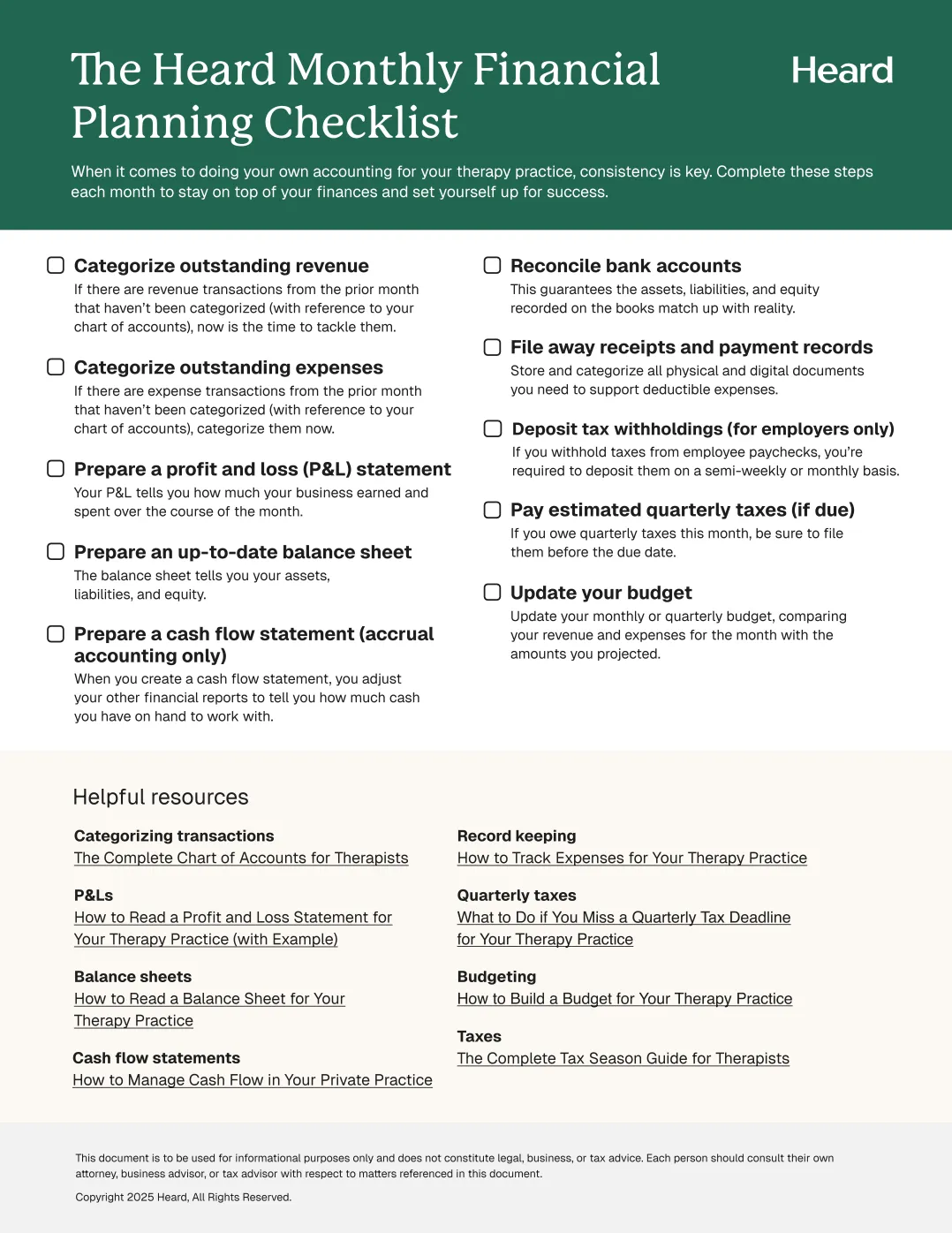Selling your therapy practice may not only make sense financially, but be emotionally rewarding as well.
You’ve invested effort, intent, and years of your life into building your practice. Giving up control and letting others take the steering wheel may be difficult, but many therapists who sell their businesses afterwards report feelings of achievement, freedom, and relief.
Here are the steps to selling your therapy practice. Selling a business can be incredibly complex—it’s best to proceed with the help of an accountant and lawyer.
{{resource}}
Commit time to the sale
Preparing your practice for sale demands a major commitment of time and energy. Don’t let the work you’re doing to sell your business negatively affect how your business is run. Remember, your clients come first.
If you’ve been putting together your weekly schedule on an ad hoc basis, now is the time to create something more concrete. Do your best to determine exactly how many hours per week you need for client sessions, extra work outside of sessions (organizing and reviewing notes), and administrative tasks (emails, billing, finances.)
Once you’ve done that, you should be able to see how many hours per week you can feasibly devote to selling your business.
Hire professional help
It’s essential to have an accountant and a lawyer working for you when you sell your business. In addition, you may want to hire an appraiser or a broker to help with the sale.
An accountant will ensure you have all the information you need—like financial reports and forecasts—when you approach buyers. They may also be able to advise you on steps you can take to make your practice more attractive to buyers from a financial perspective.
A lawyer will draw up contracts for the sale of your business, the transfer of assets, and any provisions included in the sale—such as non-disclosure agreements (NDAs), or contracts specifying which staff will stay on after the sale, and their roles.
Besides these two professionals, you may also hire a business appraiser or a business broker.
A business appraiser determines the value of your business based on seller’s discretionary earnings (SDE) (more on that below). Because of their familiarity with the market and their understanding of what buyers are looking for, they can help you set a price that will appeal to buyers without putting you at a disadvantage. After an appraiser has appraised your business, it’s up to you to find buyers and negotiate the sale.
A business broker does the work of an appraiser—helping you set a price on your business—but also helps you market your business, connect with buyers, and complete the sale. They may be able to advise you on tax matters and other technical aspects of the sale.
A business broker may be a huge help selling your business, but they don’t come cheap. Expect to pay your business broker 5% - 10% the value of the sale.
Keep it quiet
If you’re planning on selling your therapy practice—or even just considering it—try to keep the matter to yourself, or between a few people. You should only discuss it with your accountant and lawyer, other professionals you hire, and close friends and colleagues until you have identified a path forward.
Word travels quickly, and there are three groups of people you don’t want knowing you’re selling your practice until the timing is right:
- Competitors
- Clients
- Employees
You may not think of your practice having competitors. But it’s possible a larger practice—or a business operating on a different model, like a therapy app—could learn you’re preparing to sell, and use the information to their advantage.
Perhaps more importantly, you might not want your clients to know just yet. They may worry that their fees will increase, that you will stop being their therapist, or that you’re no longer committed to your role. Even if none of these is true, there are many fears and insecurities clients can bring to bear on the situation. They may feel betrayed or abandoned. It’s better not to have a discussion with clients until the sale is finalized and you have identified the best way to address it with them.
Finally, any employees you have may worry about their job security in the event you sell. They may believe they’ll be laid off by new business owners, have their hours cut, or face other difficulties. Or, they may worry you’ll let them go before the sale, in order to increase the bottom line. Until the terms of the sale are finalized and you can tell employees definitively what they can expect, you may want to keep your plans to yourself.
Consider who you will sell your practice to
Before you even begin the process of listing your business for sale, you may ask yourself: Who buys a therapy practice, anyway?
Generally:
- Another practice. A larger practice looking to expand may buy yours, or you may sell it to another practice as part of the conditions of a merger, with you becoming a shareholder in the other practice.
- Hospitals and employee assistance programs (EAPs). These typically buy therapy practices and subsume them under their own, larger firms.
- Venture capitalists (VCs), either individuals or a VC firm. Typically, VCs buy private practices at a low rate when the owners are preparing to retire.
- Equity firms. Recently, equity firms have begun buying medical and dental practices, and “corporatizing” them. Some equity firms have begun buying therapy practices, as well.
- Employees. In some cases—particularly when the owner retires—employees may buy a business, becoming partners or shareholders. Typically, the price you sell your business to employees for will be less than you would ask from another business.
If you hire a business broker, they’ll be able to identify the best market for your private practice, and help you sell it to the right people.
{{resource}}
Make your private practice sellable
Here are some steps you can take, before selling your practice, to make it more appealing to buyers.
Increase cash flow
By tightening up your billing cycle, taking care to quickly follow up unpaid bills, and favoring payment processors that get money to you ASAP, you can improve your private practice’s cash flow. Learn more about cash flow for private practices.
Cut unnecessary expenses
By reviewing your therapy practice’s budget, and identifying expenses you can reduce (or cut entirely), you may be able to grow your bottom line. Not only does that make your business more profitable, but any buyers examining your books will be able to see you run a tight ship.
Expand secondary revenue streams
Your secondary revenue sources—after your main client list—may include online classes, writing and speaking gigs, or group therapy sessions or workshops held offsite. Increasing the time and energy you devote to these secondary sources makes your income more diverse. That’s a good thing for buyers looking for a resilient business with the potential to expand.
Get your financial back office organized
When your financials are organized, it means you’ve put in place systems to manage:
- Day-to-day bookkeeping
- Budgeting
- Financial reporting
- End-of-year accounting
- Recordkeeping, and
- Tax filing
Without those, you’ll run into three problems selling your business:
- You won’t have the data you need (financial reports, past tax filings) to prove your business is profitable and has the potential to grow
- Your practice will seem disorganized and poorly managed, which buyers don’t like
- Due diligence will take longer (more on that below)
If your finances are a mess, the first step to take is finding a bookkeeping and accounting solution that can get you caught up and all your data in order. Learn more about what bookkeepers and accountants can do for your practice.
Put a price on your practice
You will put a price on your business based on your seller’s discretionary earnings (SDE).
Your private practice’s SDE consists of:
- Its net annual income, before taxes
- Your personal earnings (a salary or owner’s draw)
- Any depreciation or amortization of business assets
- Income you may earn on investments
- Non-recurring expenses
Essentially, it’s what your business earns in a year, minus the cost of paying you, the owner, plus the cost of taxes.
The price of your business will be a multiple of your SDE—typically one to four times your SDE.
Some businesses can refer to an index to determine their SDE multiple. For businesses that rely heavily on the owner’s and employees’ expertise, experience, and reputations, an index won’t suffice; there are too many variables in play. In that case, it’s necessary to hire a business appraiser or broker.
Therapy practices typically fall under this category. An appraiser or broker can help you put a price on your practice.
Work with your lawyer to prepare the paperwork
Your lawyer will draw up all the necessary contracts for selling your business.
The biggest and most important document to prepare is your asset purchase agreement. Some of its contents are based on your financial records, so you may need to consult with your accountant to make sure you have all the information you need.
The asset purchase agreement lays out everything that will be transferred from you to the buyer during the course of the sale. It will also specify your role in the business after the sale, and whether you will stay on as a therapist working at the practice for a limited or indefinite amount of time.
One of the assets included in the asset purchase agreement is “goodwill.” This is the reputation your business has built up. The agreement will include clauses meant to prevent you from damaging this goodwill, typically summed up in a non-compete clause.
{{resource}}
Create a selling memo for your therapy practice
Your selling memo is kind of like a really long, comprehensive sales brochure. It’s the document you give to potential buyers so they can learn about your business and decide whether they may be interested in buying it.
If you hire a broker, they’ll create a selling memo for your practice. It will include:
- Business description, including your history, who owns it, and how it operates
- Location, including information on your lease if you have one
- Strengths, or the factors that set your business apart from others and provide opportunities for future growth
- Competitive overview, a look at the status of your industry and the general features of your competition
- Services, more or less what your practice does to make money
- Operations, how your practice is organized and operates day-to-day
- Marketing, including industry trends, marketing opportunities, and profiles of your client base
- Employees, including credentials, experience, compensation, and benefits
- Financial plans, including growth projections
- Potential buyer concerns, anything buyers should take into account when considering your business
- Financial information covering the past three years
- Offering price, and the terms of the sale
Your selling memo will also include an appendix with additional information supplementing each of the topics above.
List your business
One of the benefits of having a broker is that they’ll reach out through their network to find potential buyers for your practice.
If you don’t have a broker, you may decide to sell your practice using an online directory like BizBuySell.
Negotiate the sale
If a buyer decides to make an offer, they’ll submit a letter of intent.
You may choose to accept the offer in the letter of intent, or negotiate for a different price or different terms of sale. If you decide to do so, and you don’t have a broker working for you, it’s a good idea to contact your lawyer. They can help walk you through the process of negotiation.
Finalize the sale
Once you and the buyer have agreed on a price, selling your business is not so simple as signing a few forms and getting a check.
First, the buyer needs to complete due diligence. The amount of time this takes varies, but plan to budget a few months.
During due diligence, the buyer will take a deep dive into your financials and your business operations. This is their chance to make any last minute business moves before purchasing your practice, including hiring additional staff, borrowing money, or making plans for when they take over.
Once due diligence is complete, you and the buyer sign the asset purchase agreement, and any supporting documents that come with it. Then, the buyer transfers you the price you agreed upon.
Finally, give yourself a pat on the back. Congratulations! You just sold your private practice.
—
Buyers are looking for a business that turns a good profit. Even if you’re years away from selling your private practice, you can take steps now to invest in your business and improve its profitability. Learn more about how to build a profitable therapy practice.
This post is to be used for informational purposes only and does not constitute legal, business, or tax advice. Each person should consult their own attorney, business advisor, or tax advisor with respect to matters referenced in this post.
Bryce Warnes is a West Coast writer specializing in small business finances.
{{cta}}
Manage your bookkeeping, taxes, and payroll—all in one place.

Discover more. Get our newsletter.
Get free articles, guides, and tools developed by our experts to help you understand and manage your private practice finances.
When you join Heard, you’ll work with a team of bookkeepers and accountants who specialize in therapy practices. Schedule a free consult to learn more.
Schedule a free consult




